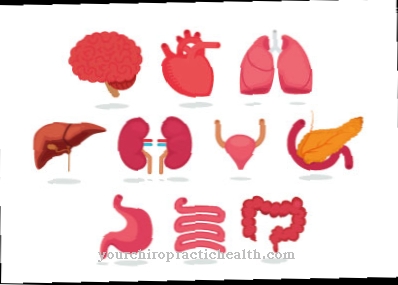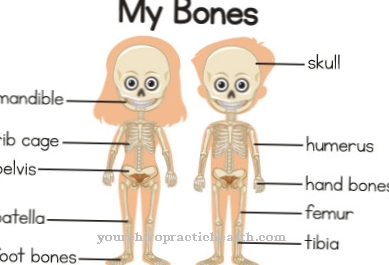Affected one histrionic personality disorder, short HPS, show pronounced theatrical and egocentric behavior. Therapy can only take place when those affected show insight and seek help themselves, and consists of long-term psychotherapy.
What is Histrionic Personality Disorder?

© Photographee.eu - stock.adobe.com
Like all personality disorders, that shows up HPS in a pattern of perception and behavior described as abnormal. This influences the entire personality in its thinking, feeling and relationship behavior and has a negative effect on the entire professional and everyday life of those affected.
Those affected by histrionic personality disorder show an emotionality that others perceive as exaggerated and tend to dramatize their experience. These feelings shown appear superficial and superficial to others, because those affected cannot and do not want to allow deep, real feelings and do not have a real sense of identity. Those affected are therefore easily influenced and change their minds very quickly.
Another symptom is the constant search for attention and new experiences. Histrionics are sensitive to not being the center of attention and try every means to attract attention. People who suffer from HPS show unsteady and fast-moving relationships. Their social contacts rarely go deep and rely on sexual attraction, making same-sex friendships especially difficult.
causes
The causes of the histrionic personality disorder are not sufficiently researched to date to be able to provide detailed information on this.
As with all personality disorders, the cause seems to be in childhood. If children have not been able to develop their own identity, if they have been given a false sense of love and attention, or if they lack stable, supportive relationships and sufficient attention from the outside world for feelings, a personality disorder develops. Psychological research also suspects a genetic predisposition in those affected.
The causes of personality disorder appear to lie in trauma in early childhood or even pregnancy. However, it is not clear how it is decided which type of personality disorder those affected develop.
Symptoms, ailments & signs
Signs of a histrionic personality disorder seldom arise from observation or a singular trait alone. Symptomatic of the histrionic personality disorder, however, is that a person in the overall picture often shows an unnatural urge to self-expression. The emotions, which for third parties seem very exaggerated, mostly revolve around finding recognition, being praised and attracting attention to the personal life situation.
A special theatricality of the feelings that persists is typical for this form of personality disorder. What many of those affected have in common is that they initially appear interesting, funny and entertaining to their fellow human beings. The urge, however, to always want to be the center of attention in social situations and to act out one's own feelings in a very exaggerated manner, often leads to increasing social isolation of those affected.
Most people who suffer from this disorder do not perceive their own appearance as noticeable in comparison to that of their fellow human beings. As with many mental illnesses, there is no insight into the illness at the beginning of a diagnosis. Those affected notice that they cannot keep social contacts for long, they experience themselves as socially excluded, but often do not attribute this to their own external impact.
Diagnosis & course
The diagnosis is made in the diagnostic department of a psychiatric or psychotherapeutic clinic.
First of all, the presence of a personality disorder must be proven using standardized test methods. The exact personality disorder must then be diagnosed using the criteria of the Diagnostic and Statistical Manual of Mental Disorders, DSM-IV.
Differential diagnoses are to be observed and clearly excluded. If at least five of the following symptoms are present, a histrionic personality disorder is proven:
1. Feeling uncomfortable when the person concerned is not the focus
2. The patient tries to attract attention with his physical appearance
3. Interpersonal contacts between those affected are characterized by exaggerated sexually attractive behavior
4. The emotional state of the person concerned changes quickly and appears superficial
5. But it is theatrical and exaggerated and the person concerned tends to self-dramatize
6. Descriptions of the person concerned are not very detailed
7. The patient is easy to influence
8. The relationship is disturbed, relationships are perceived as closer than they are.
Histrionic disorder is created in childhood and first appears as such in early adult life. The extent to which those affected can be enabled to lead a life that is regarded as normal depends on the severity of the disorder and the timely therapeutic intervention. In principle, however, personality disorders are not considered to be completely curable.
Complications
Since the histrionic personality disorder is characterized by egocentricity, the constant search for attention, theatrical behavior, exaggerated emotionality, strong emotional fluctuations and manipulative behavior in combination with a low tolerance for frustration and a lack of empathy for the needs of others, this results in a number of complications in interpersonal dealings .
Affected people find it difficult to build stable, healthy relationships. The environment usually reacts strange to their behavior. This is especially true when trivial events (which they are not for the patient) are excessively exaggerated. The constant search for attention and the need to be the center of attention often keep other people at a distance.
This is also the case when the manipulation techniques with which histrionics try to enforce their needs are recognized and rejected. These strategies, learned at an early stage and inherent in histrionic personalities, repeatedly lead to interpersonal conflicts. But even if histrionics are being adequately treated, the deeply anchored behavioral patterns are difficult to correct, as they were mostly learned in childhood.
When dealing with such patients, consistent behavior therapy is indicated, whereby clear rules and limits must be formulated. In addition, histrionic characters are more prone to depression and anxiety disorders, so that there is often a comorbidity. Depression and anxiety can be treated with medication. Overall, however, this results in a very complex treatment requirement.
When should you go to the doctor?
Conspicuous behavior that is described by fellow human beings as being above the norm must always be examined by a doctor. If people in the immediate vicinity notice a change in their usual appearance, it is advisable to seek medical advice. With a histrionic personality disorder it is part of the clinical picture that there is no insight into the disease on the part of the person concerned. The sick people are therefore dependent on the support and judgment of relatives or people in their social environment. You have an increased responsibility to contact a doctor and ask for help. It is advisable to gain the trust of the person concerned in order to be able to initiate a visit to the doctor together with him.
As soon as the appearance of a person is severely emotionally hurtful or established rules are not followed in everyday life, a doctor should be consulted. If those affected behave inconsiderately, if they violate the privacy of their fellow human beings or if they are disrespectful, it makes sense to investigate the cause. If the behavior of several people in the social environment can no longer be tolerated despite all attempts, a visit to the doctor is advisable. In particularly difficult situations, compulsory induction can take place. For this purpose, a medical officer must be called to give an assessment of the situation.
Doctors & therapists in your area
Treatment & Therapy
The histrionic personality disorder requires lengthy treatment that is exhausting for the patient, relatives and also the psychotherapist.
Therapy is only possible if the person concerned sees a need for action and therapy himself, as his cooperation is an important prerequisite for the success of the therapy. Compared to other personality disorders, those affected by HPS seem to seek help faster and bring greater insight with them.
Behavior therapy offers the best prospects. Research into the causes can be carried out and it can be helpful, but it is more important to show those affected new behavioral options and to practice them. Psychotropic drugs can be used in conjunction with therapy if those affected suffer from depression, but they are not helpful for pure HPS.
You can find your medication here
➔ Drugs for personality disordersOutlook & forecast
Therapy for histrionic personality disorder is difficult and lengthy. Those affected lack any insight into the nature of their illness. Therefore, the prognosis is generally not very good. Setbacks and discontinuation of therapy are to be expected in the case of a histrionic personality disorder.
The problem lies in the lack of recognition and acceptance of those affected by this diagnosis. Most people with histrionic personality disorder think they are physically ill or have some other mental illness.Even if careful differential diagnosis has shown that it is not, they insist on their assumption. The patient therefore often refuses therapy. Often there are suicidal tendencies due to the dramatic personality structure. The inconsiderate patient wants to achieve by all means that the therapy is broken off or suspended.
The prognosis is only improved if the person concerned is willing to acknowledge the reality of their illness with a histrionic personality disorder. The histrionic personality disorder is not treatable without permanent therapy. There are currently no drugs against such disorders. In this respect, the prospect of improvement for the majority of those affected is poor.
Success can only be achieved with long-term cognitive behavioral therapy. The behavioral problems and irrational actions persist, however, if the patient is not confronted with alternative options for action.
prevention
Of the histrionic personality disorder Only parents in early childhood can prevent this by raising their offspring to be strong personalities. Those affected themselves have no prevention options.
Aftercare
After inpatient or partial inpatient therapy, outpatient care should be provided for further treatment of the histrionic personality disorder. The focus of this aftercare is often the rehabilitation of the patient and reintegration into the professional and private environment. From a behavioral perspective, treating people with personality disorders takes several years.
The coping methods learned in therapy must be stabilized, which can only be guaranteed through continuous supervision. During this time, the patient has the opportunity to try out new types of behavior and experience that can be consolidated in further outpatient therapy. Cooperation with a psychotherapist or the community in group therapy are therefore important measures in aftercare.
If the problem is particularly severe and persistent, another psychotherapeutic treatment - in the sense of an interval treatment - may be necessary after a few years. The success of the treatment in the various stages of rehabilitation and after the treatment has been completed can be evaluated using questionnaires, interviews or reports.
Once the symptoms have subsided and the patient has been successfully reintegrated, he is considered rehabilitated. However, the patient should still be given the option to seek psychotherapeutic help, or a permanent contact person should be provided.
You can do that yourself
Due to the ego-synthony of the disorder, those affected with histrionic personality disorder can rarely be treated as such because of the disorder. They are more likely to seek medical help for secondary psychological illnesses such as anxiety disorders or depression.
To date, no drugs have been developed against this disorder. However, those affected can certainly be helped within the framework of psychotherapy. Particularly promising is cognitive behavioral therapy, in which the psychotherapist tries to break up his dysfunctional thought structures in cooperation with the person concerned. It is important that the personality traits behind the disorder are not given up. As with any personality disorder, they are part of your character. As part of the therapy, however, the person affected learns to reduce the manifestations of his or her personal characteristics to a reasonable level so that a histrionic personality disorder can become a histrionic personality style.
If the person concerned manages to find the way back to (real) recognition and happiness, the conditions that justify an intervention are reduced, namely suffering and impairment. The relatives can help those affected with empathy and a lot of patience. You need to be informed about the clinical picture so that you can correctly interpret the behavior of the person affected.


.jpg)


.jpg)
.jpg)




















